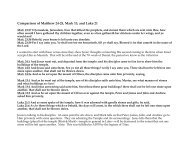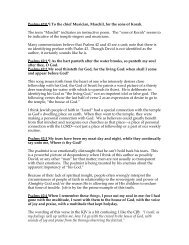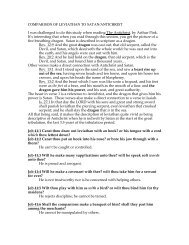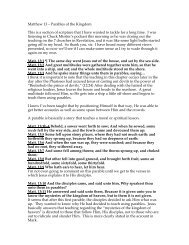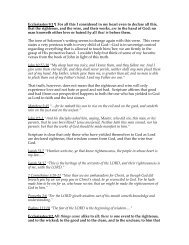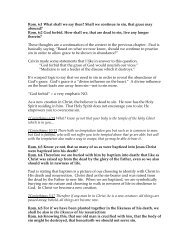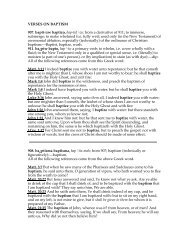Ezek. 21:1 And the word of the LORD came unto me, saying, Ezek ...
Ezek. 21:1 And the word of the LORD came unto me, saying, Ezek ...
Ezek. 21:1 And the word of the LORD came unto me, saying, Ezek ...
You also want an ePaper? Increase the reach of your titles
YUMPU automatically turns print PDFs into web optimized ePapers that Google loves.
<strong>Ezek</strong>. <strong>21</strong>:4 Seeing <strong>the</strong>n that I will cut <strong>of</strong>f from <strong>the</strong>e <strong>the</strong> righteous and <strong>the</strong><br />
wicked, <strong>the</strong>refore shall my s<strong>word</strong> go forth out <strong>of</strong> his sheath against all flesh<br />
from <strong>the</strong> south to <strong>the</strong> north:<br />
<strong>Ezek</strong>. <strong>21</strong>:5 That all flesh may know that I <strong>the</strong> <strong>LORD</strong> have drawn forth my<br />
s<strong>word</strong> out <strong>of</strong> his sheath: it shall not return any more.<br />
Again, emphasis is made that <strong>the</strong> judg<strong>me</strong>nt will be complete according to God’s<br />
<strong>word</strong>. Everyone in <strong>the</strong> land will be affected in so<strong>me</strong> way, i.e., death by s<strong>word</strong>,<br />
famine, pestilence, captivity, etc. This is necessary to <strong>the</strong> testimony <strong>of</strong> <strong>the</strong> truth<br />
<strong>of</strong> God’s <strong>word</strong>.<br />
“it shall not return any more” – Obviously, this is not a state<strong>me</strong>nt <strong>of</strong> non-stop<br />
judg<strong>me</strong>nt. In reading through <strong>the</strong> different translations it would seem that it is a<br />
state<strong>me</strong>nt that <strong>the</strong> declared judg<strong>me</strong>nt will be completed with this stroke <strong>of</strong> His<br />
s<strong>word</strong>. When Neb shows up on <strong>the</strong> scene this ti<strong>me</strong>, he will not have to return to<br />
complete <strong>the</strong> job. In o<strong>the</strong>r <strong>word</strong>s, <strong>the</strong> s<strong>word</strong> will not be shea<strong>the</strong>d until <strong>the</strong><br />
declared judg<strong>me</strong>nt has been completed.<br />
<strong>Ezek</strong>. <strong>21</strong>:6 Sigh <strong>the</strong>refore, thou son <strong>of</strong> man, with <strong>the</strong> breaking <strong>of</strong> thy loins; and<br />
with bitterness sigh before <strong>the</strong>ir eyes.<br />
<strong>Ezek</strong>. <strong>21</strong>:7 <strong>And</strong> it shall be, when <strong>the</strong>y say <strong>unto</strong> <strong>the</strong>e, Wherefore sighest thou<br />
that thou shalt answer, For <strong>the</strong> tidings; because it co<strong>me</strong>th: and every heart shall<br />
<strong>me</strong>lt, and all hands shall be feeble, and every spirit shall faint, and all knees<br />
shall be weak as water: behold, it co<strong>me</strong>th, and shall be brought to pass, saith<br />
<strong>the</strong> Lord GOD.<br />
The Hebrew for <strong>the</strong> <strong>word</strong> sigh indicates to “groan or mourn.” The loins are<br />
equated with <strong>the</strong> reins in humans, according to Webster; this would be<br />
referencing <strong>the</strong> place <strong>of</strong> “affections and passions.” That would explain why<br />
so<strong>me</strong> <strong>of</strong> <strong>the</strong> translations reference a broken heart. The point is that <strong>Ezek</strong>iel is to<br />
physically depict an attitude <strong>of</strong> deep sorrow and anguish before <strong>the</strong> people.<br />
When <strong>the</strong>y ask him what is wrong, he is to answer that it is because <strong>of</strong> <strong>the</strong><br />
<strong>me</strong>ssage <strong>of</strong> God’s <strong>word</strong>. That <strong>me</strong>ssage is <strong>me</strong>ant to strike utter fear in <strong>the</strong> heart <strong>of</strong><br />
all those in Judah because <strong>the</strong> ti<strong>me</strong> <strong>of</strong> God’s longsuffering has ended and <strong>the</strong><br />
ti<strong>me</strong> <strong>of</strong> judg<strong>me</strong>nt has co<strong>me</strong>. It would also be devastating news to <strong>the</strong> captives<br />
who held out hope for <strong>the</strong>ir ho<strong>me</strong>land and <strong>the</strong>ir loved ones at ho<strong>me</strong>.<br />
<strong>Ezek</strong>. <strong>21</strong>:8 Again <strong>the</strong> <strong>word</strong> <strong>of</strong> <strong>the</strong> <strong>LORD</strong> <strong>ca<strong>me</strong></strong> <strong>unto</strong> <strong>me</strong>, <strong>saying</strong>,<br />
<strong>Ezek</strong>. <strong>21</strong>:9 Son <strong>of</strong> man, prophesy, and say, Thus saith <strong>the</strong> <strong>LORD</strong>; Say, A s<strong>word</strong>,<br />
a s<strong>word</strong> is sharpened, and also furbished:<br />
<strong>Ezek</strong>. <strong>21</strong>:10 It is sharpened to make a sore slaughter; it is furbished that it may<br />
glitter: should we <strong>the</strong>n make mirth it contemneth <strong>the</strong> rod <strong>of</strong> my son, as every<br />
tree.<br />
Sharpening and furbishing a s<strong>word</strong> is making preparation to ensure <strong>the</strong><br />
effectiveness <strong>of</strong> <strong>the</strong> weapon when wielded. We know that Nebuchadnezzar (and<br />
his armies) is <strong>the</strong> s<strong>word</strong> being referenced. The Hebrew for contemneth states “to<br />
spurn or disdain.” “My son” is a reference to Israel/Judah.<br />
Ex. 4:22 <strong>And</strong> thou shalt say <strong>unto</strong> Pharaoh, Thus saith <strong>the</strong> <strong>LORD</strong>, Israel is<br />
my son, even my firstborn:



